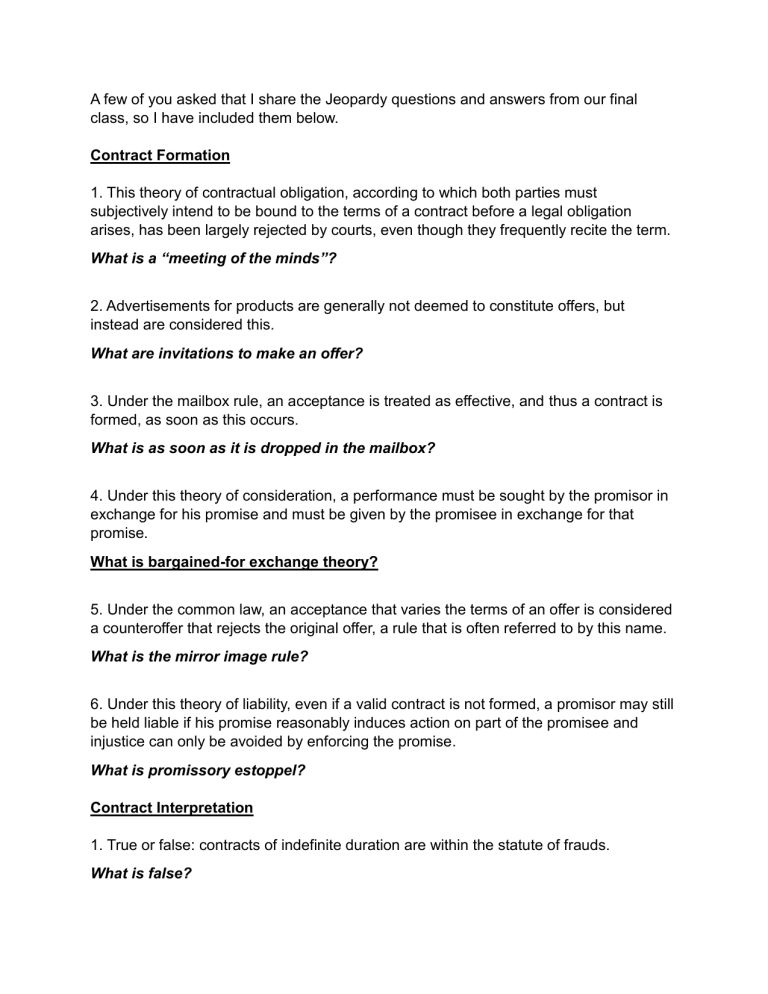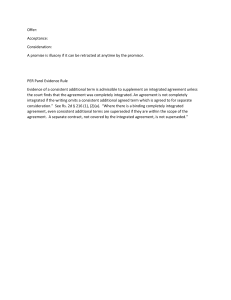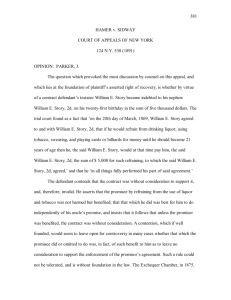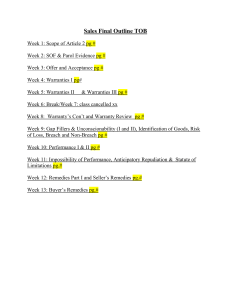
A few of you asked that I share the Jeopardy questions and answers from our final class, so I have included them below. Contract Formation 1. This theory of contractual obligation, according to which both parties must subjectively intend to be bound to the terms of a contract before a legal obligation arises, has been largely rejected by courts, even though they frequently recite the term. What is a “meeting of the minds”? 2. Advertisements for products are generally not deemed to constitute offers, but instead are considered this. What are invitations to make an offer? 3. Under the mailbox rule, an acceptance is treated as effective, and thus a contract is formed, as soon as this occurs. What is as soon as it is dropped in the mailbox? 4. Under this theory of consideration, a performance must be sought by the promisor in exchange for his promise and must be given by the promisee in exchange for that promise. What is bargained-for exchange theory? 5. Under the common law, an acceptance that varies the terms of an offer is considered a counteroffer that rejects the original offer, a rule that is often referred to by this name. What is the mirror image rule? 6. Under this theory of liability, even if a valid contract is not formed, a promisor may still be held liable if his promise reasonably induces action on part of the promisee and injustice can only be avoided by enforcing the promise. What is promissory estoppel? Contract Interpretation 1. True or false: contracts of indefinite duration are within the statute of frauds. What is false? 2. Unlike the implied warranty of merchantability, this warranty, which requires that goods be suitable for the particular use that the buyer has for them, applies to both merchants and non-merchants? What is the implied warranty of fitness for a particular purpose? 3. In C&J Fertilizer v. Allied Mutual Insurance, the court held in favor of an insured party and against an insurer with respect to an insurance claim after a burglary, despite the presence of a clause in the insurance company’s form contract clearly excluding the type of burglary that occurred, due to this doctrine of interpretation. What is the reasonable expectations doctrine? 4. Under this maxim of interpretation, if a written contract contains a word or phrase which is capable of two reasonable meanings, one of which favors one party and the other of which favors the other, that interpretation will be preferred which is less favorable to the one by whom the contract was drafted. What is omnia praesumuntur contra proferentem? 5. Under the parol evidence rule, evidence of prior or contemporaneous agreements or negotiations are inadmissible to contradict or vary the terms of a valid written instrument, but parol evidence is admissible for this purpose. What is interpretation? 6. Where a contract’s terms give discretion to one party to decide whether the other party’s performance is satisfactory, courts have often limited this exercise of discretion by this implied duty. What is the duty of good faith? Contract Defenses 1. If a party, by reason of mental illness or defect, is unable to act in a reasonable manner in relation to a transaction and the other party has reason to know of this condition, any resulting contract is invalid under this version of the mental incapacity defense. What is the mental incapacity/volitional/affective test? 2. True or false: a threat to breach a contract or withhold payment may not qualify as a wrongful threat for the purposes of proving duress. What is false--these actions may be a wrongful threat if they are made in bad faith? 3. For a contract to be considered unconscionable, a plaintiff must show both substantive unconscionability, meaning the terms are unfair, and this, meaning that the negotiation itself was unfair. What is procedural unconscionability? 4. This doctrine will excuse a party from performing his obligations under a contract if performing the obligations becomes unreasonably difficult or expensive. What is impossibility? 5. In Oppenheimer v. Oppenheim, the court held that a subletter was excused from its contractual obligation to sublet business offices because the counterparty provided telephonic, rather than written, notice of the landlord’s consent, because, the court found, the written consent provision was this type of condition to the contract, which must be strictly satisfied. What is an express condition? 6. Name one option that a party to a contract has if it receives notice from the other party that the other party intends not to perform its obligations. o Treat the anticipatory repudiation as a total repudiation and sue for breach o Suspend performance and wait to sue until the performance date o Treat the repudiation as an offer to rescind and treat the contract as discharged o Ignore the repudiation and urge the promisor to perform



